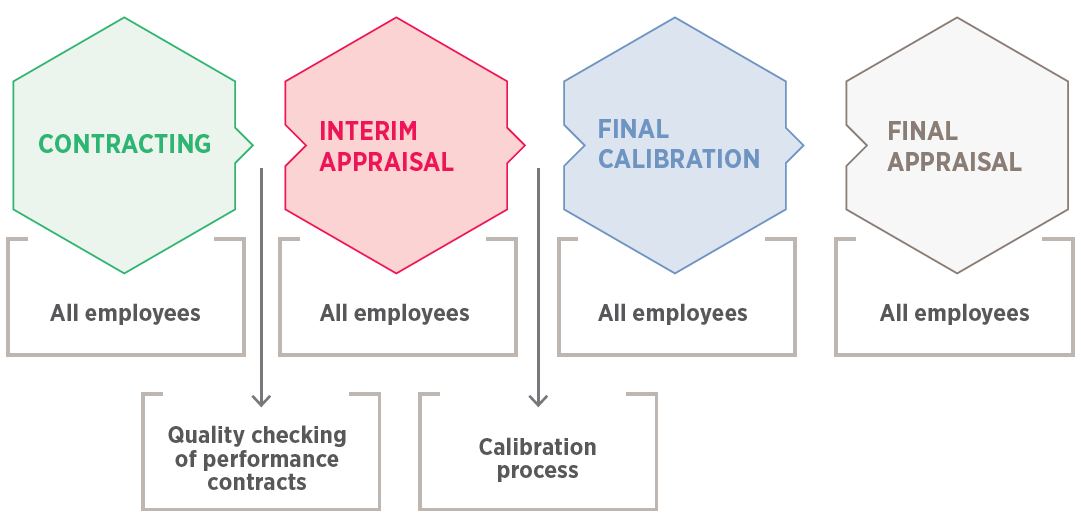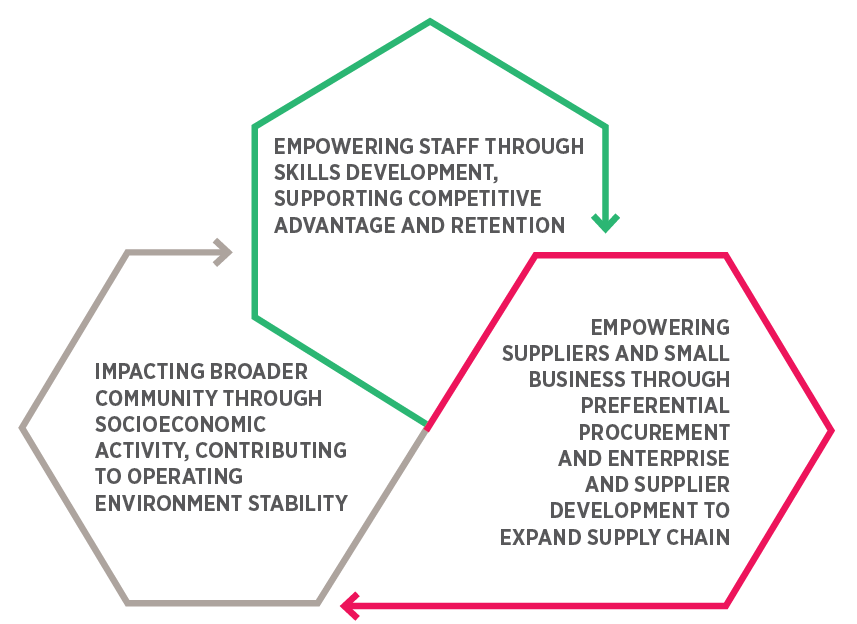
Implementation of the One Company – One Mindset initiative

First culture survey launched with an overwhelming 77% RESPONSE rate and 83% POSITIVE SENTIMENT, showing a high level of engagement

158 UNEMPLOYED youth participated in learnership programmes (2021: 129 unemployed youth)

2 992 employees completed the 2022 Voice of the Employee survey with an overall score of 85.3% – THE HIGHEST SCORE OVER THE LAST 10 YEARS

2 588 employees participated in online courses (2021: 3 816 employees)

R4.8 million invested towards developing DIFFERENTLY-ABLED PEOPLE (2021: R3.6 million invested)

Human capital
Our people philosophy
The core of our AfroCentric value proposition is our passion for people. Our human-centric practices and policies have consistently enabled our organisation to attract, develop and retain a skilled and talented workforce, facilitating a high-performance culture that supports the achievement of our strategic objectives. Founded on the core philosophy of transformation and empowerment, we strive to build a diverse workforce supported by an inclusive culture.
We strongly encourage all our employees and leaders to be grounded and take accountability for their actions. We take great pride in our AfroCentric values, which are central to who we are and how we show up every day. We work tirelessly to create an environment fully supportive of all employees – nurturing mental, emotional, physical and spiritual wellbeing.
Diversity and inclusion
Transformation remains a critical strategic enabler for AfroCentric to achieve its vision of creating sustainable healthcare, thus creating a solid basis to drive sustainability for all its stakeholders. In addition, transformation is viewed as an opportunity to enable business growth while positively contributing to the economy.
Based on 4 601 active permanent employees across entities, 71% are female and 29% are male.
The ethnic representation of these individuals is as follows:
- 50% African, 2 307 actual headcount
- 17% White, 776 actual headcount
- 22% Coloured, 1 021 actual headcount
- 8% Indian/Asian, 375 actual headcount
- 3% foreign nationals, 122 actual headcount
Age range (%)

Union Members (%)

Gender (%)

Staff movement
In the past year, AfroCentric has seen an increase in women directors and senior management, but progress has been slow, and more needs to be done to improve women's representation.
During the year, we recruited 591 permanent employees, of which 42 employees resigned within the first year across entities. Females accounted for 69% of those who resigned, and males for 31%. The ethnic representation of these individuals is as follows: 46.4% Africans, 14.2% Whites, 31.9% Coloured, 4.7% Indian and 2.7% foreign nationals. First year voluntary attrition rate is 7%.
During the year, 422 employees terminated their employment with the Group. Out of total terminations, females contributed 67% and males contributed 33% of the terminations:
| African | Indian/Asian | Coloured | White | Total | |||||
| Occupational Level | Female | Male | Female | Male | Female | Male | Female | Male | |
| Top management | 2 | 1 | 0 | 0 | 0 | 0 | 0 | 0 | 3 |
|---|---|---|---|---|---|---|---|---|---|
| Senior management | 0 | 4 | 0 | 0 | 0 | 0 | 0 | 1 | 5 |
| Profession qualified | 18 | 7 | 6 | 0 | 4 | 3 | 10 | 2 | 50 |
| Skilled | 138 | 80 | 13 | 8 | 57 | 26 | 26 | 6 | 354 |
| Semi-skilled | 5 | 1 | 1 | 0 | 1 | 0 | 2 | 0 | 10 |
| 163 | 93 | 20 | 8 | 62 | 29 | 38 | 9 | 422 | |
| Total | 38% | 22% | 5% | 2% | 15% | 7% | 9% | 2% | 100% |
Employee culture journey
Our culture journey has spanned three years; however, over the years, the culture of our business has consistently been one of our most vital success factors. Supported by committed leadership and grounded by a robust set of organisational values, we have sustained a workforce of engaged, productive and happy employees.
The AfroCentric Group has grown considerably. Some of these changes have included taking on large schemes, merging schemes, partnering with new subsidiaries and diversifying our offering to distribution services, among other changes. The growth across the Group led us to review the current culture; therefore, the culture survey was launched.
Our people purpose of One Company – One Mindset was formulated from the Leaders Enablement People and Alignment Forum held during the year. Moreover, the process of embedding our values has rejuvenated the mindset of our employees. This initiative seeks to re-engage and connect leaders and employees to our desired culture.
Employee engagement
A key driver in building a strong culture is maintaining high levels of employee engagement. Therefore, we utilise surveys to understand matters that are top of mind for our employees.
The culture, Voice of the Employee and monthly pulse surveys provide engagement platforms that empower leaders with insight into our employees' perceptions and evolving needs. In addition, our approach to employee action plans, which involve co-creation and ongoing measurement, supports continuous engagement.
Skills development
We are committed to developing our people to create a high-performance culture that achieves our strategic objectives. The Group provides comprehensive learning and development opportunities, an employee wellness programme and other upliftment opportunities.
Employee wellbeing
We recognise that employees feel more competent and valued when their holistic needs are catered for, including physical, mental, and financial.

Performance management
AfroCentric uses a balanced scorecard approach for performance management. The balanced scorecard provides the tools for management to drive competitive success. It translates the organisation's strategy into performance measures that provide the framework for a strategic measurement and management system. To be a progressive organisation, we continuously research best practice to build a high-performance culture.
When managing individual performance, we aim for a mutually beneficial environment where managers and employees share clear expectations and objectives from the outset. Employees participate in all phases of the performance management process and share ownership of the outcomes with the organisation.
Continuous conversations, feedback and development

Managing performance is not an annual event but a continual process of feedback and collaboration. Performance discussions are therefore expected to cover more than simply performance ratings. Instead, leaders should have regular, meaningful conversations to close performance gaps and enable individuals to understand how their performance and behaviour link to the organisational strategy and how their contributions drive business growth.
Our performance management system aims to enable:
- A streamlined performance management process to direct line managers' time from administrative activities to that of ongoing performance conversations
- High-quality performance discussions, giving employees more frequent feedback and addressing performance gaps in real time
- The creation of a high-performance culture within the organisation
- Employee lead performance management
- Difficult conversations that drive positive change
Transformation and B-BBEE
As a black-owned company and the most transformed health-related business listed in South Africa, we are committed to corporate citizenship, driving transformation and upholding our social licence to operate. The Group invests in healthcare-related companies, and our contribution to healthcare extends beyond our products and services. Our social impact starts within the Group and extends to the suppliers and communities we directly impact and the broader society affected by our health management initiatives. We value diversity, equity and inclusion at AfroCentric and aim to create an environment where differences are not only valued, but accepted and included, as demonstrated by our diverse workforce and supply chain.
B-BBEE creates opportunity while mitigating operating environment risk

Level 2 B-BBEE contributor status
AfroCentric's transformation framework supports national strategic priorities and our purpose of creating sustainable healthcare solutions to enhance our stakeholders' quality of life.
The degree of the Group's alignment of B-BBEE policies and practices to the requirements of the different transformation-related legislation in support of the South African Government's overall economic transformation includes, but is not limited to:
- The National Development Plan 2030
- The National Strategy for Broad-Based Black Economic Empowerment
- The Revised Broad-Based Black Economic Empowerment Act 53 and related amendments
- The Amended Codes of Good Practice on Broad-Based Black Economic Empowerment of 2013
- The Employment Equity Amendment Act of 2014 and associated regulations
- Skills Development Act and related Skills Development Levies Act
- The Preferential Procurement Act
Element |
Weighting | 2022 | 2021 | 2020 |
| Equity ownership | 25.00 | 25.00 | 25.00 | 25.00 |
|---|---|---|---|---|
| Management control | 19.00 | 14.01 | 12.39 | 12.69 |
| Skills development | 25.00 | 14.47 | 14.97 | 20.10 |
| Enterprise and supplier development | 44.00 | 40.59 | 43.69 | 39.28 |
| SED | 5.00 | 5.00 | 5.00 | 5.00 |
| Total | 118.00 | 99.07 | 101.05 | 102.07 |
| B-BBEE level | Level 2 | Level 1 | Level 1 |
ACT ownership profile (July 2021) |
2022 | 2021 | 2020 |
| Black exercisable voting rights | 50.28 | 51.17 | 45.72 |
|---|---|---|---|
| Black exercisable voting rights by black females | 16.45 | 15.07 | 11.05 |
| Black entitlement to economic interest | 50.18 | 51.17 | 45.72 |
| Entitlement to economic interest by black women | 16.39 | 15.07 | 11.05 |
| Economic interest that flows through to black designated groups | 11.63 | 5.13 | 4.97 |
| Involvement of ownership of the enterprise of black new entrants | 2.24 | 2.58 | 2.14 |
The 2021 B-BBEE certificate issued on 17 December 2021 is valid until 16 December 2022
Supporting our communities
We recognise that the sustainability of AfroCentric is closely linked to the socioeconomic environments in which our businesses exist. Accordingly, our role as a socially responsible enterprise includes a strong focus on supporting broader communities, and we are dedicated to improving community life and access to economic opportunities.





